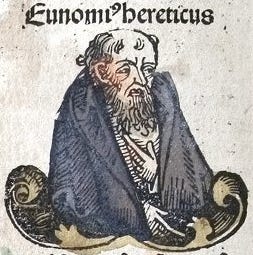What Was Arianism?
A primer on late fourth-century Arianism through the writings of Eunomius of Cyzicus
What was Arianism? Here is a primer on late fourth-century Arianism through the writings of Eunomius of Cyzicus, who might have been the most influential Arian of his era.
In his Liber Apologeticus, Eunomius criticizes the notion that the Father and Son can share the same essence since one is Unbegotten by nature and the other is Begotten by nature. The essence of God would be confused, and the result would be one essence that was “Son-who-was-not-begotten” and “Father-who-did-not-beget,” since the Son was never begotten in time but always was begotten.
Eunomius positively confesses that the Unbegotten begot and created by will (γνὠμῃ) the only-Begotten God who, relative to the creatures that the Son created (as demiurge), retains the status of Godhead. Let me walk through this step-by-step.
First, Eunomius writes, “we have not ascribed begetting to the essence of God (it is unbegotten).” In other words, the Unbegotten is God in the truest sense. To include the Begotten Son into the essence of God would imply “separation and partition” in the incorruptible God and materialism in the Simple God; Eunomius denies both.
For this reason, second, Eunomius writes, “we assert that the Son was begotten when as yet he was not.” For the word begotten to make any sense, Eunomius infers, it must mean that the Begotten Son was begotten when he was not yet! Or else to say that Begotten Son always was makes the notion of begotten meaningless, which is what Eunomius says the Nicene position is: nonsense!
But Eunomius has to be careful here since the Unbegotten begetting the Son would make the Unbegotten separable and material-like. So Eunomius makes key distinctions. First, the only Begotten is not like other created things made out of nothing. This is because, second, the Unbegotten made him “on the basis of the will (γνὠμῃ).” This creates a “distinction” (διαφοράν) between the Son and all other creatures because through this willful creation of the Son, “the creative power was begotten coexistentially in him from above; he is therefore the Only-begotten God of those things which came into existence after him and through him.”
The logic here is important to track. As the unique and only begotten Son made by the will of the Unbegotten before all things through whom all things came into being. Citing John 1:3, Eunomius believes he has found the right way to speak of the Begotten and the Unbegotten while also creating a distinction between the Son and all other creatures, which means all creatures should view the Son as God precisely because the only Begotten God has the power of the creator (τῆς δημιουργικῆς δυνάμεως) from the Unbegotten in or with him. This creative power belongs to the Son only because “he alone was begotten and created by the power (δυνάμει) of the Unbegotten.”
In summary, Eunomius in his Liber Apologeticus criticizes the Pro-Nicene view of God for confusing contradictory essences into one (Unbegotten and Begotten). Later, Eunomius will insist that a relation of begetting between the Unbegotten and Begotten not only creates a logical confusion but also is “a human and bodily” analogy, one which we must reject. Instead of a relation of essence, Eunomius argues there is one of will between the Unbegotten and the Son. Further, the Son is still God because God’s creative power worked through him to create all things as John 1:3 says.
Basil of Caesarea and then later his brother Gregory of Nyssa will respond to Eunomius with devasting arguments. In short form, they argue (1) that the analogy of begetting need not be ultra-literal (or univocal). The created analogy of begetting among humans only provides a fitting analogy revealed in the names Father and Son themselves! Incidentally, here they regularly imply how strange it is that Eunomius calls God Unbegotten and not Father!
They also argue (2) that the diastema (gap) created by the Father begetting the Son according to will places Christ on the side of creatures. He cannot be God. So given that the Bible calls Christ God, Eunomius cannot account for this.
(3) They agree that the Son had the creative power of God, but that power belongs to the Son essentially because of his works (energeia) that can only be done by one who possesses the power of God. And if the Son has the power of the one God, he shares the essence of God with the Father.
More could be said. But that’s enough for the moment!














